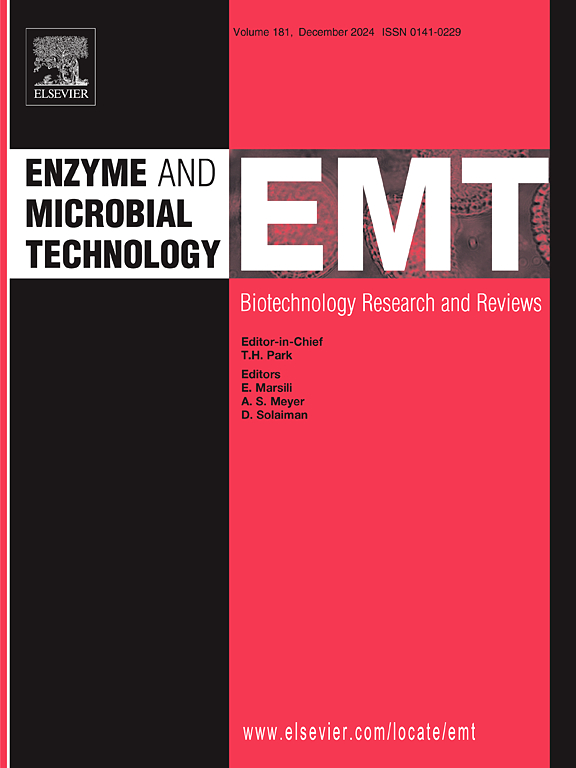A new cold-active transglutaminase: Discovery, computational insights, and recombinant expression
IF 3.7
3区 生物学
Q2 BIOTECHNOLOGY & APPLIED MICROBIOLOGY
引用次数: 0
Abstract
Transglutaminases (TGases) are versatile enzymes widely applied in food, biomedical, and material sciences, but the cold-active TGases are underexplored despite their significance in low-temperature bioprocessing. This study reports the identification, computational characterization, and recombinant expression of a new transglutaminase (akTGase) derived from the Antarctic krill transcriptome. Bioinformatics analysis revealed that akTGase was estimated of 84.76 kDa, possesses structural traits consistent with cold adaptation, including elevated hydrophilicity, high levels of methionine and aspartic acid but low arginine content, and high proportions of flexible regions. Molecular dynamics simulations at 4 °C and 25 °C showed enhanced surface flexibility and conformational stability at low temperature. Recombinant akTGase was produced in E. coli, recovered from inclusion bodies via stepwise dialysis, and assayed for enzymatic activity. The refolded akTGase displayed significantly higher specific activity at 4 °C than at 25 °C, confirming its cold-active nature. This work highlights a successful strategy combining transcriptomic mining, structural prediction, and experimental validation for the discovery of psychrophilic enzymes, particularly TGase, offering promising potential for sustainable applications in cold-adapted biocatalysis.
一种新的冷活性转谷氨酰胺酶:发现、计算见解和重组表达
谷氨酰胺转胺酶(Transglutaminases, TGases)是一种广泛应用于食品、生物医学和材料科学的多用途酶,但冷活性的谷氨酰胺转胺酶在低温生物加工中具有重要意义,但其研究尚不充分。本研究报道了从南极磷虾转录组中提取的一种新的谷氨酰胺转胺酶(akTGase)的鉴定、计算表征和重组表达。生物信息学分析表明,akTGase的分子量为84.76 kDa,具有较高的亲水性、高水平的蛋氨酸和天冬氨酸(精氨酸含量低)和高比例的柔性区等与冷适应一致的结构特征。在4°C和25°C下的分子动力学模拟表明,低温下表面柔韧性和构象稳定性增强。在大肠杆菌中产生重组akTGase,通过逐步透析从包涵体中回收,并测定酶活性。重组后的akTGase在4°C的比活性明显高于25°C的比活性,证实了其冷活性。这项工作强调了一种成功的策略,结合转录组挖掘,结构预测和实验验证,发现了亲冷酶,特别是TGase,为冷适应生物催化的可持续应用提供了有希望的潜力。
本文章由计算机程序翻译,如有差异,请以英文原文为准。
求助全文
约1分钟内获得全文
求助全文
来源期刊

Enzyme and Microbial Technology
生物-生物工程与应用微生物
CiteScore
7.60
自引率
5.90%
发文量
142
审稿时长
38 days
期刊介绍:
Enzyme and Microbial Technology is an international, peer-reviewed journal publishing original research and reviews, of biotechnological significance and novelty, on basic and applied aspects of the science and technology of processes involving the use of enzymes, micro-organisms, animal cells and plant cells.
We especially encourage submissions on:
Biocatalysis and the use of Directed Evolution in Synthetic Biology and Biotechnology
Biotechnological Production of New Bioactive Molecules, Biomaterials, Biopharmaceuticals, and Biofuels
New Imaging Techniques and Biosensors, especially as applicable to Healthcare and Systems Biology
New Biotechnological Approaches in Genomics, Proteomics and Metabolomics
Metabolic Engineering, Biomolecular Engineering and Nanobiotechnology
Manuscripts which report isolation, purification, immobilization or utilization of organisms or enzymes which are already well-described in the literature are not suitable for publication in EMT, unless their primary purpose is to report significant new findings or approaches which are of broad biotechnological importance. Similarly, manuscripts which report optimization studies on well-established processes are inappropriate. EMT does not accept papers dealing with mathematical modeling unless they report significant, new experimental data.
 求助内容:
求助内容: 应助结果提醒方式:
应助结果提醒方式:


